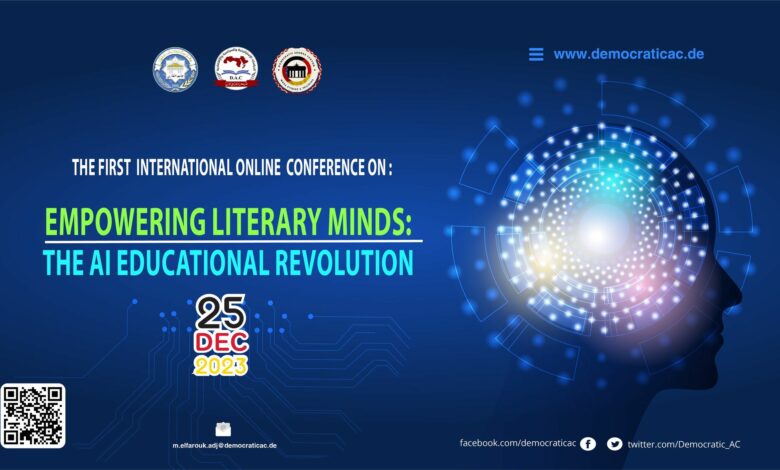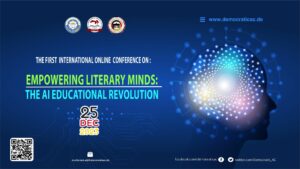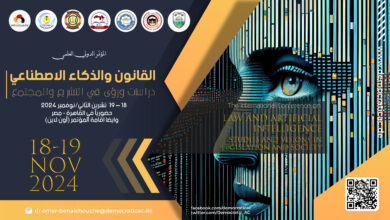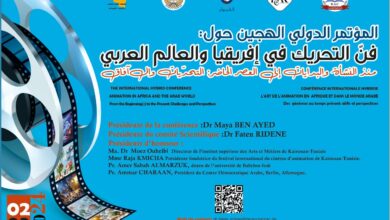Empowering Literary Minds: The AI Educational Revolution

The #Democratic_Arabic_Center based in Germany – Berlin, is pleased to announce the First International Online Conference on
Empowering Literary Minds: The AI Educational Revolution
25 – 12 – 2023
In collaboration with
The University of Benghazi – Libya
Conference Chair : Dr. Imane ZEGHOUDI – Lecturer “B” Higher School of Teachers, Laghouat (Algeria)
President of the Scientific Committee : Dr. Mohammed El-Farouk ADJEB – Research Professor “A” – Center for Research in Islamic Sciences and Civilization, Laghouat (Algeria)
Honored Committee
- Prof Dr . Azeldeen Younis El-Dressi (President of University of Benghazi
- Dr. Youssif Zaghwani Omar – University of Benghazi
-
Prof . Ammar Sharaan – Head of Democratic Arabic Cente
Conference management
- Conference Director: Dr. Karim AICHE
- Director of Publication : Dr. Ahmed Bohko
The Scope of the Conference
In an era defined by rapid advancements in technology, the world of education is experiencing a profound transformation. At the forefront of this revolution is the dynamic synergy between Artificial Intelligence (AI) and the age-old pursuit of literature. As we navigate the 21st century, where the traditional boundaries between the realms of human creativity and machine intelligence continue to blur, we find ourselves standing at the cusp of a literary renaissance. This renaissance, powered by AI, is poised to breathe new life into the art of teaching and learning literature, and it promises to empower literary minds in ways previously unimagined
Literature has long been celebrated as a gateway to exploring the human experience, delving into the depths of culture, emotion, and thought. Its study is a time-honoured tradition, but the methods and tools available for its exploration have evolved significantly. The emergence of AI as a driving force behind this evolution has ushered in a new era where the age-old classics and contemporary masterpieces find fresh relevance in the digital age. This article embarks on a journey to explore the multifaceted ways in which AI is revolutionizing the world of literature education, from personalized reading lists and immersive literary experiences to interactive learning platforms and global literary communities. With AI as our guide, we’ll delve into the transformative power of technology in empowering literary minds and shaping the future of education
Main Objectives
The main objectives of this conference, titled “Empowering Literary Minds: The AI Educational Revolution,” are multi-faceted and ambitious. First and foremost, we aim to elucidate the profound impact of Artificial Intelligence on literature education. Through a comprehensive exploration of various AI-powered tools and methodologies, our objective is to showcase how technology is enhancing the teaching and learning of literature. We endeavour to provide conference attendees with a deeper understanding of AI’s role in creating personalized, engaging, and inclusive literary education experiences, thereby increasing student engagement and fostering a love for literature
Additionally, this conference seeks to highlight the practical applications of AI in literature instruction. We aim to offer educators, institutions, and educational policymakers insights into the potential benefits of integrating AI technologies in the classroom. Our objective is to promote the adoption of AI-driven tools and platforms for literature education, emphasizing their capacity to improve accessibility, streamline assessment, and encourage diverse perspectives
Furthermore, we intend to encourage a broader conversation about the ethical considerations associated with the use of AI in education, particularly in the context of literature. It is essential to address concerns related to privacy, bias, and the preservation of the human touch in teaching. Ultimately, this conference strives to inspire thought leaders, educators, and literary enthusiasts to embrace the AI educational revolution as a means of revitalizing the study and appreciation of literature in our ever-evolving digital landscape
The Main Argument
The main argument of this conference, “Empowering Literary Minds: The AI Educational Revolution,” is that the integration of Artificial Intelligence (AI) into literature education has the potential to revolutionize the teaching and learning of literature. We contend that AI technologies, when applied thoughtfully and ethically, can significantly enhance the literature education experience by personalizing learning, offering efficient text analysis, creating immersive and interactive literary environments, and fostering global literary communities. The transformative power of AI can empower students to engage more deeply with literary works and educators to provide more effective and inclusive instruction
Research Questions
- How can AI be effectively harnessed to personalize literature education and cater to the diverse needs and interests of students
- What AI-driven tools and methodologies are most promising for enhancing the understanding and analysis of complex literary texts
- In what ways can AI-powered games and interactive platforms create immersive literary experiences that captivate and engage students
- How can AI-driven virtual companions and chatbots stimulate literary discussions and encourage deeper literary analysis among students
Topics of the Conference
Here is a selection of topics that you can delve into for research or discussion. Nevertheless, feel free to explore other related themes as well
- The Impact of AI on Language Proficiency
- Personalized Learning with AI
- AI in Literature Research and Trends
- AI-Generated Creative Writing and Storytelling
- AI and Language Learning in Literature Education
- Challenges and Limitations of AI in Language Education
- AI Integration in Teaching Materials
- AI-Enhanced Student-Teacher Collaboration
- AI-Language Assessment and Feedback
- AI-Generated Literature and Creativity
- The Future of AI in Literature Education
Terms and Conditions for Participation and Publication
- The submission should be within (15 pages) including references, tables, figures, and images
- Participating researchers must follow the recognized scientific principles for research preparation and writing, especially in terms of documenting information sources, citations, and maintaining scientific integrity regarding references, in addition to the correctness of language and style
- Submissions are accepted in English
- Individual and joint submissions are accepted, and doctoral students are allowed to participate with their supervising professors
- It is mandatory to attach a brief curriculum vitae of the participant
- The first page of the article should include the complete title of the article in the language of the research and a translation of the article’s title in English for articles written in other languages. It should also include the name of the researcher, their academic position, affiliated institution, city, country, email, and two abstracts with keywords. The number of lines in a single abstract should not exceed ten lines
- The article should be written in Times New Roman font size 12, with margins of 2 cm on all sides and line spacing of 1 cm
- The documentation style is APA, where references are cited in the text by mentioning (Author, Year, Page) within parentheses, and full reference details are provided at the end of the research
- Research papers are subject to scientific review, and the participating researcher is committed to adjust to the research in light of the reviewers’ comments if requested. This is in preparation for publication, and the conference committee has the right to make some formal modifications to the article when necessary without affecting the content
Submissions that meet the above conditions should be sent to the email
m.elfarouk.adj@democraticac.de
Participation Rights
- – Participation is free of charge
- – The participating researcher will receive an electronic copy of the conference proceedings, in addition to a certificate confirming their participation
- – Research studies only represent the views of their authors, and they alone bear full responsibility for data validity and any subsequent issues related to scientific ethics and integrity
Important Dates
The deadline for receiving full-text submissions: 10 – 12 – 2023
Democratic Arab Center For Strategic, Political & Economic Studies
Deutschland – Berlin
Continue on the Viper-Whats App : 00491742783717





